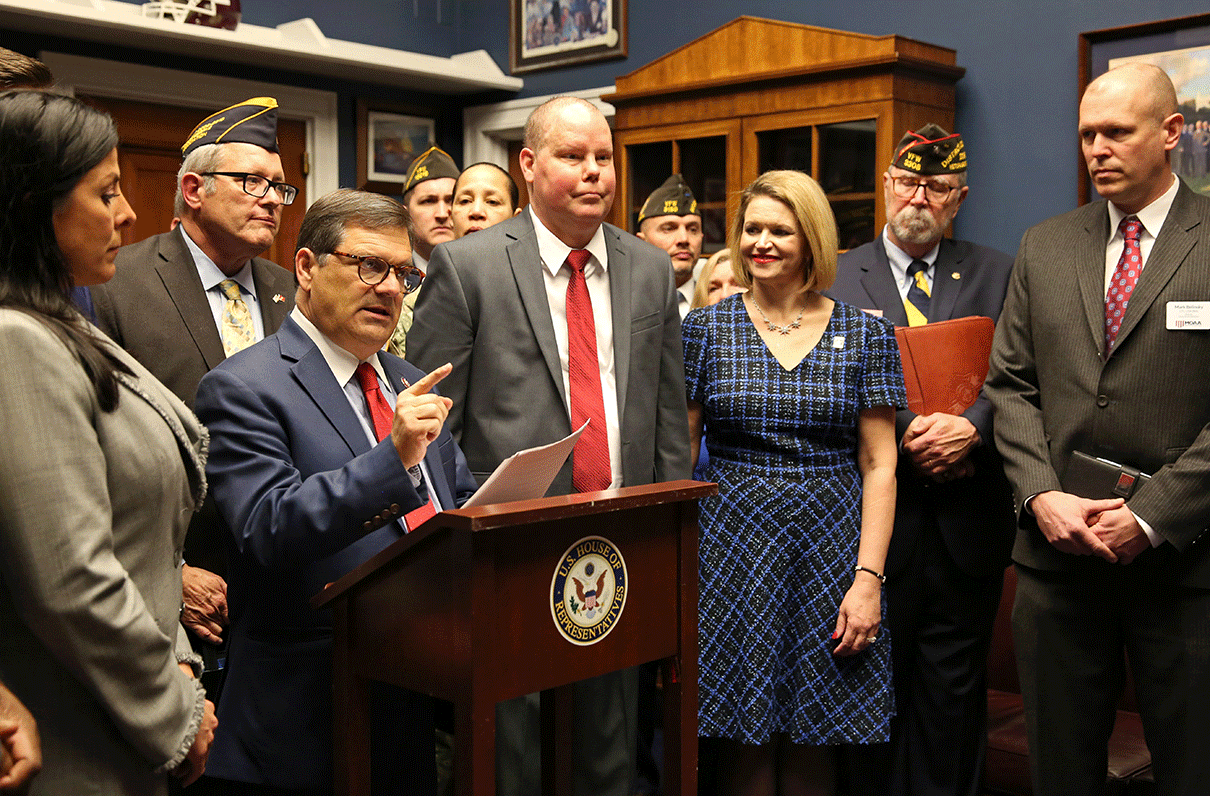Maj. Richard Star is a combat veteran who has never smoked a day in his life; he also has terminal lung cancer. As such, Star will medically retire early from the Army after a distinguished career as a combat engineer that included critical route clearance and road construction missions in Afghanistan and Iraq.
[TAKE ACTION: Support concurrent VA disability pay and retired pay for combat-related retirees]
Those who traveled on those IED-infested roads know the route clearance engineers are absolute heroes who saved countless military and civilian lives. Unfortunately, following his early retirement, Star and his family will suffer a financial penalty for being forced out of the military and medically retiring him under Chapter 61 of Title 10 – Retirement or Separation for Physical Disability.
Servicemembers who are unable to complete 20 years of service due to service-connected injuries are known as “Chapter 61 retirees.” Some retirees who suffered from injuries incurred in combat are eligible for Combat Related Special Compensation (CRSC) which mitigates to varying degrees some loss in pay due to the offset.
The Maj. Richard Star Act, announced in a Capitol Hill press conference on Tuesday, provides total offset relief for those with combat injuries – ensuring they get their full service-earned retirement based on time in service and grade, as well as their disability compensation from the VA for service-connected injuries or illness.
“These retirees are unjustly denied the benefits they deserve, and in this country that should never, never happen,” said Rep. Gus Bilirakis, R-Fla., who introduced the bill in the House. A companion bill is pending in the Senate from Sen. Jon Tester (D-Mont.). This is a bipartisan and bicameral effort to correct an injustice and keep us on the path towards concurrent receipt for all.

Background on Concurrent Receipt
A retired servicemember, who also receives VA disability compensation, has an amount equal to that compensation deducted from their military retirement pay. In some cases, the servicemember forgoes their entire military retirement pay. Congress has approved concurrent receipt of both retired pay and disability compensation only for those who are 50% or more disabled and completed at least 20 years of creditable service. Remaining to be approved are those same retirees who are 40% disabled and below, and retirees with less than 20 years creditable service with combat-related and other injuries or illnesses.
Prior to 2004, military retirees could not receive both retirement pay and disability pay because it was erroneously perceived as a duplication of benefits or “double dipping.” In 2004, MOAA and The Military Coalition successfully lobbied Congress to implement concurrent receipt for retirees who are rated 50 percent disabled or greater. This alone was a hard-fought battle over many years.

Maj. Richard Star in Iraq in 2017.
Remaining to be approved are those who are 40% disabled and below, and those who were unable to complete 20 years of service due to service-connected injuries or illness. There are approximately 210,000 Chapter 61 retirees. Some retirees who suffered from injuries incurred in combat are eligible for Combat Related Special Compensation (CRSC) which mitigates some loss in pay due to the offset, but the injustice remains. There are approximately 42,000 of these individuals.
MOAA has long argued that retired pay and VA service-connected disability compensation are fundamentally different benefits, granted for different reasons. Military retired pay is an earned benefit for vested years of service. Service-connected disability compensation is for injury. To deny retired pay because of a disability is an injustice.
The Congressional Budget Office estimates that eliminating full concurrent receipt would cost more than $30 billion over 10 years. An incremental approach, such as the Maj. Star Act, chips away at the total cost by first eliminating subsets of the population who are still awaiting concurrent receipt of both pays.
Passage of this act would reduce the number of people still awaiting total concurrent receipt, which ultimately reduces the cost of continued wins toward total concurrent receipt. We acknowledge the Maj. Star Act is not the whole solution, but it is progress.
Star and his wife Tonya attended the press briefing, and they are resilient.
“At this point, my goal in life is to take care of family and friends,” Maj. Star said at the briefing. Among those in attendance were caregivers of combat veterans and NCOs the Star family had become close with during treatment at Walter Reed Hospital. An impressive drive to never stop serving.



